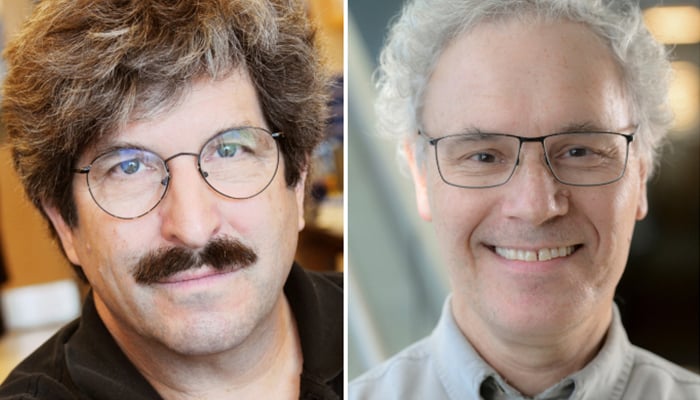US duo win Nobel for gene regulation breakthrough
Ambros, Ruvkun win Nobel Prize in Medicine for discovery of microRNA and its role in genes regulation
STOCKHOLM: US scientists Victor Ambros and Gary Ruvkun won the Nobel Prize in Medicine on Monday for their discovery of microRNA and its role in how genes are regulated, solving a decades-old mystery, the Nobel Assembly at Sweden's Karolinska Institute said.
If gene regulation goes awry, it can lead to serious diseases such as cancer, diabetes, or autoimmune illnesses.
"Their groundbreaking discovery revealed a completely new principle of gene regulation that turned out to be essential for multicellular organisms, including humans," the jury said.
Ruvkun said he was shocked to win the prestigious prize.
"It's quite a sea change," the 72-year-old professor at Harvard Medical School told AFP after receiving the news in a call from the prize committee in the early hours of Monday.
"I've won other awards in the past, but those were very quiet in comparison."
"There's already been TV crews and photographers, and 300 email messages from friends!" he said, as his dog barked at the front door with more reporters arriving.
Ruvkun shared that he and Ambros are "buddies" and had a congratulatory video call that morning.
"We just FaceTimed to high-five. We've been friends for years."
Ruvkun told AFP the pair would be "celebrating like crazy," praising Ambros as "always positive and wonderful."
The Nobel committee failed to reach Ambros by telephone to give him the news. He heard it instead from an SR reporter who called.
"Wow, that's incredible! I didn't know that," the 70-year-old professor at the University of Massachusetts medical school said, adding: "Good. Wonderful."
Speaking at a press conference organised by the University of Massachusetts Medical School — where Ambros is a professor — he said he had left his phone downstairs and slept until late in the morning.
"We get a call from my son who calls my wife [....] and says: 'If you get a call from somebody in Sweden, answer it'," Ambros said, explaining people had started trying to reach his son instead.
Collaborating but working separately, Ruvkun and Ambros conducted research on a one millimeter roundworm to determine why cell mutations occurred and when.
They discovered microRNA, a new class of tiny RNA molecules that play a crucial role in gene regulation, which in turn allows each cell to select only relevant instructions.
Their findings were published in two articles in 1993.
"The seminal discovery of microRNA has introduced a new and unexpected mechanism of gene regulation," Secretary General of the Nobel Assembly, Thomas Perlmann, told reporters.
"MicroRNAs are important for our understanding of embryological development, normal cell physiology and diseases such as cancer," he said.
Medical trials under way
Gunilla Karlsson Hedestam, a biology professor at the Karolinska Institute, told reporters that "though there are no very clear applications available yet in microRNAs, understanding them, knowing that they exist, understanding their counter regulatory networks, is always the first step."
"There are quite a lot of trials ongoing, not only against cancer but also other diseases, cardiovascular, kidney diseases," she said.
"I think the significance of this discovery of microRNAs is that it allowed us to be aware of a very complex and nuanced layer of regulation whereby genes in our cells talk to each other and coordinate their activity," Ambros told a press conference.
The Nobel Prize consists of a diploma, a gold medal and a $1 million cheque to be shared by the pair.
-
Shanghai Fusion ‘Artificial Sun’ achieves groundbreaking results with plasma control record
-
Polar vortex ‘exceptional’ disruption: Rare shift signals extreme February winter
-
Netherlands repatriates 3500-year-old Egyptian sculpture looted during Arab Spring
-
Archaeologists recreate 3,500-year-old Egyptian perfumes for modern museums
-
Smartphones in orbit? NASA’s Crew-12 and Artemis II missions to use latest mobile tech
-
Rare deep-sea discovery: ‘School bus-size’ phantom jellyfish spotted in Argentina
-
NASA eyes March moon mission launch following test run setbacks
-
February offers 8 must-see sky events including rare eclipse and planet parade












